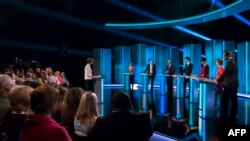The main TV debate of Britain's national election campaign yielded no clear victor with four opinion polls producing four different winners, but David Cameron's attempt to appear the most statesman-like appeared to have paid off.
The event, on Thursday night, was staged less than six weeks before a close national election on May 7 as polls suggest Cameron's Conservatives and Ed Miliband's opposition Labour Party are neck-and-neck with neither on track to win a majority.
The results of four snap opinion polls underscored why the election - that will decide who governs Britain and its $2.8 trillion economy - is being widely described as the closest and most unpredictable since the 1970s with voters naming no fewer than four winners.
One poll said Scottish nationalist leader Nicola Sturgeon had won, another said Labour's Miliband had narrowly triumphed, a third said Cameron, Miliband and UK Independence Party leader (UKIP) Nigel Farage had come joint first, while a fourth said Cameron and Miliband had both won.
None of the leaders managed to deliver a "killer line" that would set them apart from the other participants.
"There was clearly no knock-out blow," said Peter Kellner of pollster YouGov.
Jonny Tudor, 17, who asked one of the questions on the night, told Reuters afterwards: "Some performed well in answer to certain questions, other performed well on different subjects, but there was no definitive winner."
In a result that will calm Conservative nerves, a Comres/ITV poll showed 40 percent of voters judged Cameron was the most capable of leading Britain, compared to 28 percent for Miliband.
However, the debate has had little effect on voting intentions according to the first national poll since.
A Survation survey for the Daily Mirror had Labour on 33 percent and the Conservatives on 31 percent, unchanged since its last poll a week ago, although Miliband's personal approval rating had received a boost.
In an unusual format for Britain, Cameron faced off against six political rivals in what was the first and only full TV debate of a campaign that has yet to stir voters, many of whom say they feel jaded despite a rising economy.
In one of Cameron's more animated moments in an otherwise reserved performance, he pointed to his rivals, one-by-one, and said: "What I'm hearing is more debt and more taxes, more debt and more taxes, a lot more debt and more taxes, some more debt and more taxes, and definitely more debt and more taxes."
A rare moment of drama came when a female audience member briefly interrupted Cameron to complain about the number of homeless people sleeping in the streets.
'No knockout blow'
The ITV debate, held in a former pie factory near the northern city of Manchester, ranged across the economy, the health service and immigration in front of an otherwise quiet studio audience.
It put leaders of traditionally fringe parties like UKIP's Farage and Natalie Bennett of the left-wing Green Party, on an equal footing with the Conservatives and Labour, who have dominated British politics for decades.
Sturgeon, the leader of Scotland's nationalists, joined Welsh nationalist leader Leanne Wood and Nick Clegg, the leader of the Liberal Democrats, the junior party in the outgoing coalition, to complete the lineup.
Sturgeon, whose party is on course to almost wipe out Labour in Scotland, making it much harder for Miliband to win a UK-wide majority, said: "I won't pretend I don't want Scotland to be independent, I do."
Farage, whose party threatens to split the right-wing vote in particular, making it harder for Cameron to get re-elected, stirred controversy by complaining about the number of foreigners seeking treatment for HIV in Britain.
"Immigration ... is now net 300,000 people a year. It's 10 times anything this country has had to live with since 1945," he said.
Cameron, whose personal ratings are higher than those of his rivals, came off badly from Britain's first televised election debates in 2010. Over the course of three such debates, strong performances by Clegg were credited with helping deprive the Conservatives of an outright victory.
This time, Cameron resisted pressure to take part in a head-to-head debate with Labour leader Miliband, not wanting to hand his main rival a chance to improve his low personal ratings.
Miliband appeared confident in Thursday's debate but appeared momentarily flummoxed when Liberal Democrat leader Nick Clegg asked him to apologise for "crashing the economy" when Labour was in power from 1997-2010.
Regaining his poise, Miliband later fluently restated his belief that only Labour could offer a fairer way of governing the world's sixth biggest economy.
"There's one fundamental choice at this election," he said. "If I'm prime minister I'll make sure we reward the hard work of everybody in our country. Not just those who get the six-figure bonuses."









